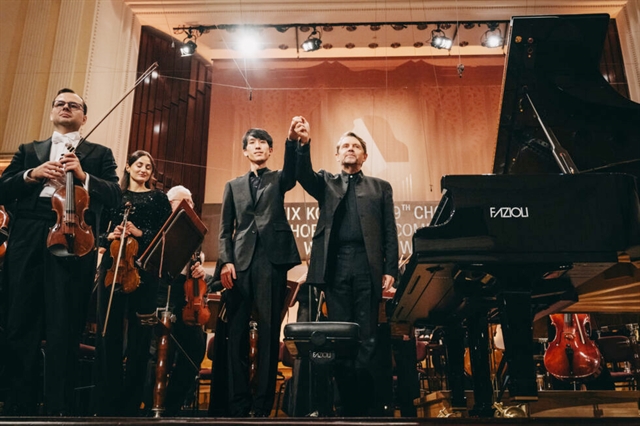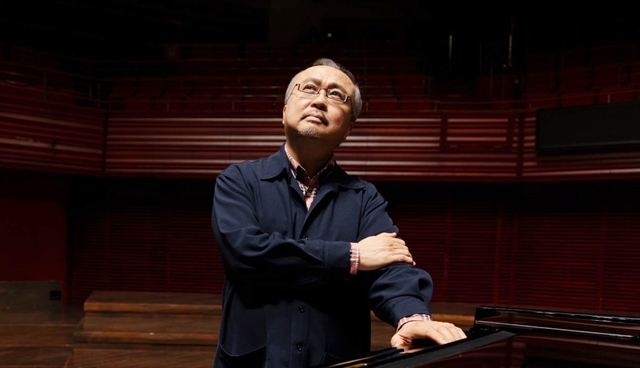 Life & Style
Life & Style

 |
| CHOPIN CHAMPION: American Eric Lu has won the 19th International Chopin Piano Competition in Warsaw, Poland. Photo courtesy of the Chopin Institute |
Vũ Hiệp
HÀ NỘI — The 19th Chopin Competition in 2025, which concluded on October 21st in Warsaw, Poland, has shown with overwhelming clarity the rise of the Asian touch in international pianists, continuing a trend reflected in numerous recent tournaments. In hermeneutics (Gadamer, Ricoeur…), each work of art not only has an 'original meaning' but also exists through the process of interpretation by the recipient. In music, the performer is the interpreter – the one who recreates the meaning of the piece of music in his own language: the sound colour, the breath, the silence, and the inner flow inside the artist. Therefore, every Chopin performance is an 'interpretation' act.
Throughout the 20th century, Chopin the composer was considered the 'territory' of the Polish, French, Russian and Italian schools – where romantic technique was combined with explosive, dramatic and individual expression. However, from the late 20th century to the 21st century, a new trend of interpretation – more lyrical, pure, introspective and meditative – emerged strongly among Asian artists.
It is a journey of De-Eurocentrism, and sometimes De-Colonialism, silently, persistently and delicately by Asian artists. Đặng Thái Sơn (First Prize winner in 1980) is the one who opened that door. He did not perform Chopin with muscular strength, but with the color of sound, breath and silence. It is a combination of Asian discipline with deep inner emotions, creating a Chopin language that is 'non-European but very Chopin.'
His direct or indirect students are currently the most prominent faces of the competition in the past two decades: Bruce Liu (First Prize 2021), Eric Lu (First Prize 2025), Zitong Wang (Third Prize 2025). All are clearly influenced by the Sơn's school: clear, light, balanced sound; emphasizing "inner flow of breathing" rather than ostentatious show of force.
If traditional European schools see Chopin as a symbol of tragic romance, then Asian interpretations see him as a poet of silence, light and void. This is the convergence of Eastern philosophy (the notion of breath, soundlessness and stillness) with the delicate European sound structure, creating a globalised Chopin language, transcending national borders.
Asian artists are not just performing Chopin, but are reinterpreting him through a different cultural horizon. Chopin is reborn as an open, living prose in dialogue between East and West. This is the expression of contemporary hermeneutics: meaning is not fixed in the original text, but is reconstructed through new interpreters and cultural contexts.
The Chopin Competitions in 1980, 2021 and this year 2025 have all been the subject of heated debates among the jury and the music-loving public. That is understandable: a new interpretation is always controversial. This year, some people felt sorry for David Khrikuli of Georgia, a philosophical timbre, but for me, he was not technically stable, showing signs of running out of steam in the final round.
 |
| CHOPIN JUDGE: People's Artist Đặng Thái Sơn served as a judge at the 19th International Chopin Piano Competition in Warsaw this year and did not score his students who were competing, in accordance with the rules. Photo courtesy of vnexpress.net |
What is most important, however, is the Asian approach has been gaining momentum: the rise of Asian-style Chopin interpretation, and this year Eric Lu demonstrated it more clearly than any other Asian contestant. He showed stability and consistency from start to finish in both technical quality and timbre, and his choice of Concerto No. 2, op.21 for the final round also set him apart from many other contestants — just like his teacher Đặng Thái Sơn 45 years ago.
Personally, I like Zitong Wang more than Eric Lu in this competition (both were Đặng Thái Sơn's students), because Eric Lu seemed a bit tense and Zitong Wang was more free as I saw it. And Tianyao Lyu — this young girl needs more time, as she lacks a bit of Chopin's worldly experience I suppose.
Once again, congratulations to artiste Đặng Thái Sơn and his two students Eric Lu and Zitong Wang. VNS




